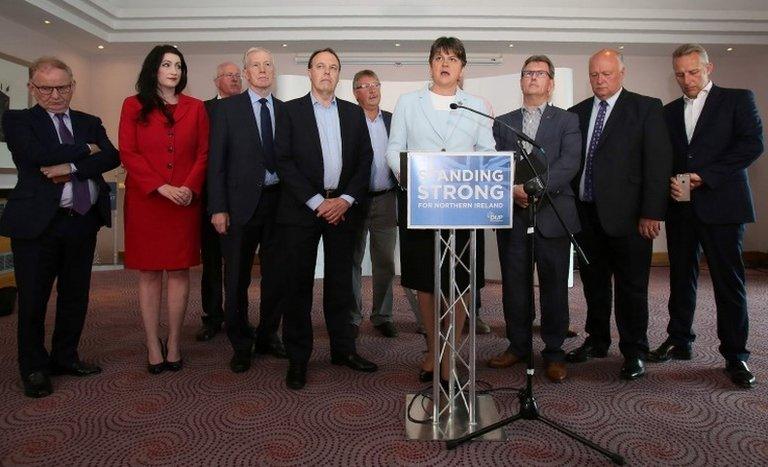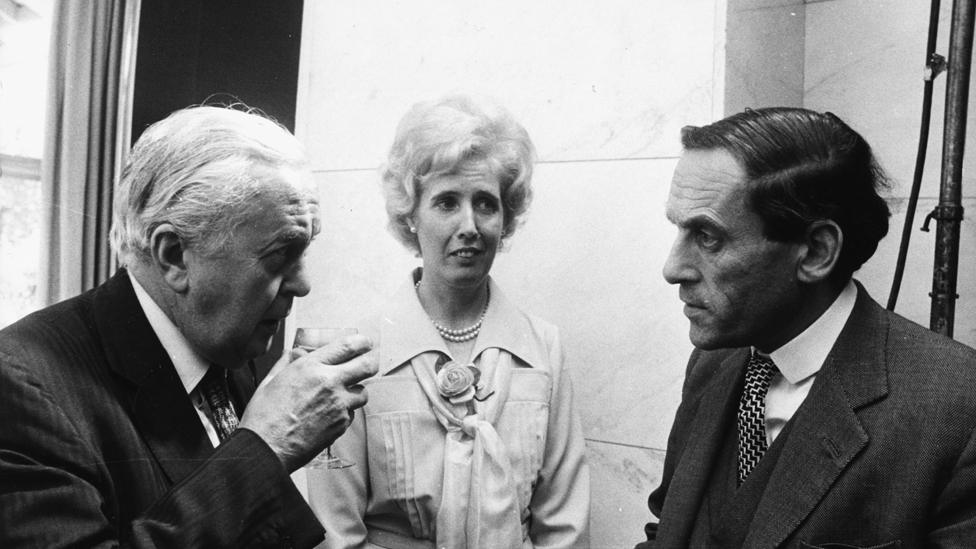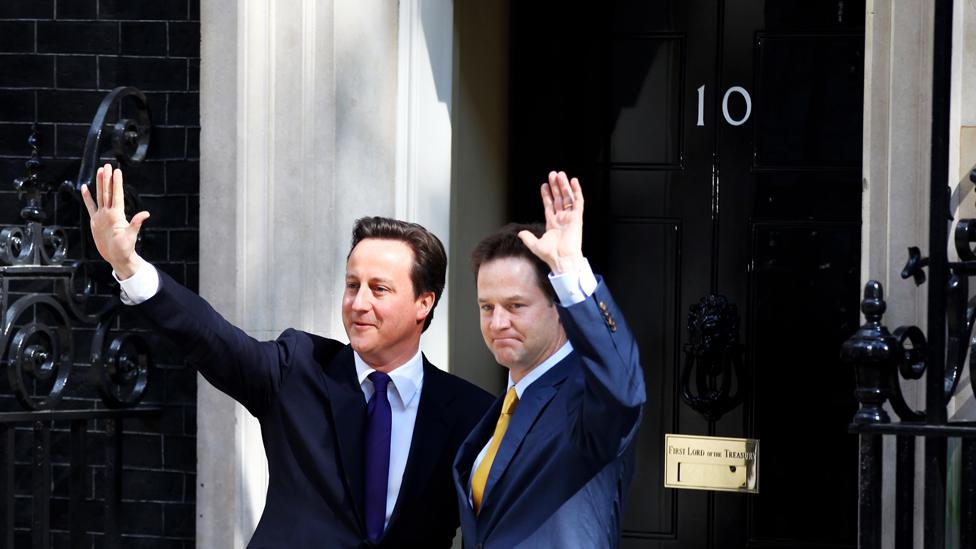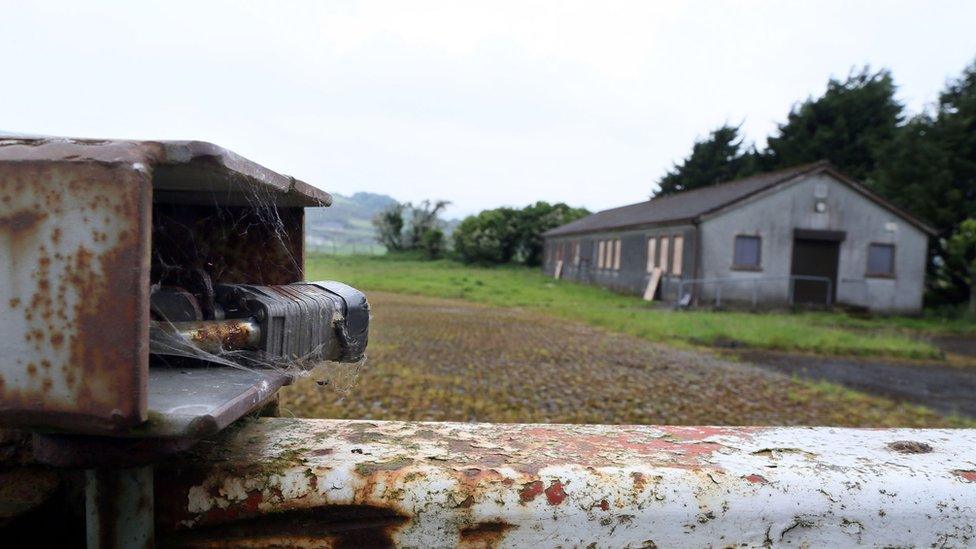Election results 2017: How will this minority government actually work?
- Published

Theresa May needs Northern Ireland's 10 DUP MPs to form her government
The incontestable truth of this general election is that the Conservative party does not have enough MPs to win votes by itself in the new House of Commons.
Nothing matters more than the parliamentary numbers and Theresa May's lack of a majority. The politics of the coming months and perhaps years will be dominated by this one fact.
Now the prime minister could try to get her legislation through vote by vote, issue by issue. But that would be a recipe for instability and unpredictability.
So she has announced that she will try to do a deal with the Democratic Unionist Party, Northern Ireland's largest unionist party.
The DUP have 10 MPs and if they vote with the Conservatives, the government will be able to get its business through Parliament.
The easiest way for the government to ensure regular DUP support in Parliament would be to agree what's called a "confidence and supply" arrangement.
The DUP would promise to back the government in votes of no confidence and supply - or budget - issues. In return, the government would support or fund some of the DUP's policies.
These deals tend to be loose and a long way short of a formal coalition.
Minority governments like this are not uncommon.
The Scottish National Party ran a minority government in Scotland a decade ago. John Major survived without a majority in the dying days of his administration in the mid-1990s. Harold Wilson and James Callaghan governed with minorities for much of the 1970s.

1974: Labour, led by Harold Wilson (left) formed a minority government after the Liberals under Jeremy Thorpe (right) failed to strike a deal with the Conservatives
But these governments can be quite constrained in what they can do, passing as little legislation as possible to avoid defeat.
They can also be unstable and short lived, if the deal between the parties breaks down and fresh elections have to be called.
So any arrangement between the Conservatives and the DUP would have a large question mark over it, particularly over how long it could last.
Confidence issue
The Institute for Government think-tank says that for minority governments to last and work, ministers, MPs and the media have to change the way they think.
Ministers have to be less majoritarian in their outlook, and be less ambitious and more realistic about what they can achieve. MPs need to learn how to do deals and make compromises.
And the media have to stop viewing every defeat as a confidence issue.
But this does not always happen.
Minority governments can linger on, scrabbling around for votes, spraying around taxpayers' money in return for parliamentary support.
What this means is MPs having to hang around the Palace of Westminster at all hours just in case there are unexpected votes.
This can mean whips - or parliamentary managers - rushing round doing deals with MPs from other parties, threatening some, bribing others. When votes are really tight, it can mean sick MPs being brought from their hospital beds in ambulances so their votes can be counted.
The biographies of MPs from the 1970s can be eye-watering in their depiction of the reality of minority government.

2010: David Cameron and Nick Clegg form a coalition government
There are also specific risks for the Conservatives in doing a deal with the DUP.
They will be in hock to a party whose views and policies they will not always find palatable.
Jonathan Powell, Tony Blair's chief of staff in Downing Street, told the BBC: "The Conservatives have made a big mistake. Theresa May has made herself a hostage to the DUP."
In terms of the politics of Northern Ireland, it may make it harder for the British government to play its traditional role of neutral mediator.
In terms of UK politics, it hooks the Tories to a party that is not known for its social liberalism.
A woman who once described the Tories as the "nasty party" may find herself having to make some rather socially conservative choices.
There are also risks to the Brexit process. A key issue will be the border between Ireland and Northern Ireland.
All sides are worried about the potential impact on the political settlement if border posts and guards are reinstated, a reminder of the divisions and violence of the past.
Some MPs fear that the DUP could shape this part of the negotiation in a way that could disrupt the sensitive status quo.

More on Brexit and the Irish border

The days of the Troubles are gone, and the border posts between Northern Ireland and the Republic lie rusting and unused.
But now the UK is getting ready to leave the EU.
Hospital patients and schoolchildren and cross-border workers are among those who have to make the daily journey. How do they see the road ahead?

And then there is just the sheer lack of numbers.
Even with the DUP, many of the votes will be tight. It will take discipline and stamina to ensure that all MPs turn up day after day to push through complicated and contentious legislation, such as the enormous Great Repeal Bill transferring EU law into UK law.
This cannot be guaranteed.
Theresa May called this election because she concluded she could not get Brexit through the House of Commons with a majority of 17. She may struggle to do it with a similar majority that is made up of another party's MPs.
Sorry, your browser cannot display this content.